Turning Your Pet Into A Viral Sensation
Kelly Lund & Loki
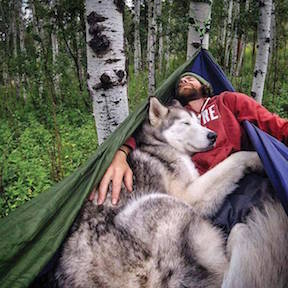 Kelly Lund and Loki, his Husky/Wolf mix, didn't intentionally become a viral Internet sensation. Kelly casually posted a picture on Instagram that was picked up by Reddit, Bored Panda and Buzzfeed. Now, Loki has over a half-million followers. Kelly will give us tips on making your pet a star.
Kelly Lund and Loki, his Husky/Wolf mix, didn't intentionally become a viral Internet sensation. Kelly casually posted a picture on Instagram that was picked up by Reddit, Bored Panda and Buzzfeed. Now, Loki has over a half-million followers. Kelly will give us tips on making your pet a star.
I'm pretty sure you've seen the picture of this guy that circulated of him in a hammock with his dog. It was one of those viral pictures that once our next guests shared it, it became a hit on Buzzfeed. All of a sudden Loki the dog was very, very popular. Kelly even quit his day job and they both did a lot of traveling.
After the photo went viral, Kelly kept his job for another year and a half. He was working for the city of Denver in the outdoor recreation department. Kelly really loved his job and didn't want to move on, but when Loki started gaining many followers, Kelly had to choose. Kelly started working independently and spent his time working on promoting Loki online through social media channels.
It all started with a picture that Kelly posted on his Instagram of himself and Loki relaxing in a hammock. He didn't think anything of it, but the following morning his neighbor texted him and told him he was on the front page of Reddit. Surprisingly, Kelly wasn't familiar with Reddit and had to look it up. Throughout that day, they had gained around 30,000 followers on Instagram. So apparently Reddit was a lot bigger deal than Kelly thought it was.
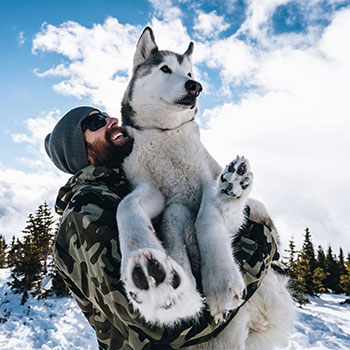 A few days later, a website called Bored Panda sent Kelly an email and wanted to write an article. After Bored Panda wrote an article about Kelly and Loki, Buzzfeed, Weather.com, The Daily Mail, USA Today and LA Times all picked it up. Many articles were written about their travels, using some of his photos as well as his posture toward not leaving your dog behind at home, as he tried to take Loki with him everywhere.
A few days later, a website called Bored Panda sent Kelly an email and wanted to write an article. After Bored Panda wrote an article about Kelly and Loki, Buzzfeed, Weather.com, The Daily Mail, USA Today and LA Times all picked it up. Many articles were written about their travels, using some of his photos as well as his posture toward not leaving your dog behind at home, as he tried to take Loki with him everywhere.
It all seems very contradictory by that fact Kelly seems like an outdoors guy who's a little bit off the grid yet at the same time he's embracing the technology that brings the world together. Kelly feels that it is give and take and that social media can be a blessing and a curse at the same time. He admits he gets wrapped up in it as much as anyone else. But the pull for him is to always try and stay present and definitely stay outside. Plus, a lot of the times he's in places that don't have cell service anyway.
When most people get a dog, the dog is brought into their world and that dog needs to adjust to their schedules and them. However, Kelly decided that instead of Loki entering into his world, he felt he had to listen closely and enter into Loki's world. Kelly explained that Loki is a husky/arctic wolf/malamute mix. He states that these northern dogs are very difficult to train and are very independent. He thinks you really have to listen to their needs. He tells us that Loki doesn't really thrive off of tension, doesn't thrive off of affection or anything like that. So the way Kelly shows him love is to get outside and let him off the leash and let him sniff, explore, run and get utterly exhausted out in the woods. So from there, it just kind of became their lifestyle more and more.
Kelly wrote a book called, "Wild Together: My Adventures With Loki the Wolfdog." He tells us publishers and publishing agents had approached him for a number of years about a book. He thought about self-publishing, but he found that he just didn't have the time and it wasn't in his bandwidth to do all of that legwork. He ended up pursuing the traditional route and is incredibly happy that he did. He said his publisher, Pegasus, was incredible to work with and it was so fun to see his books in Barnes and Noble and all of the other different places that he might not have been able to get into if he had self published.
 What does Kelly recommend for those who want to have their pet become a social media sensation? Kelly recommends not focusing on gaining followers or focusing on playing the Instagram Game as much as focusing on staying creative within yourself. Try to dream up photos in your mind and then go out and try to capture them. It's almost like an artist that would think of a picture to paint in their minds. Then they go out and do it. He tells us that is really where the hammock photo came from. He had dreamt of putting Loki in a Hammock, which at the time he doesn't think he'd ever seen a dog in a hammock before. So he went out and did it. He says you just have to take the time and be patient. Just stay focused and create your own creative process and see what you can come up with inside of yourself and then try to stay true to that as much as possible.
What does Kelly recommend for those who want to have their pet become a social media sensation? Kelly recommends not focusing on gaining followers or focusing on playing the Instagram Game as much as focusing on staying creative within yourself. Try to dream up photos in your mind and then go out and try to capture them. It's almost like an artist that would think of a picture to paint in their minds. Then they go out and do it. He tells us that is really where the hammock photo came from. He had dreamt of putting Loki in a Hammock, which at the time he doesn't think he'd ever seen a dog in a hammock before. So he went out and did it. He says you just have to take the time and be patient. Just stay focused and create your own creative process and see what you can come up with inside of yourself and then try to stay true to that as much as possible.
Visit Instagram
Pit Bulls Aren't Getting A Fair Shake
Fiona Gilbert & Koda
 Fiona Gilbert has Multiple Sclerosis, a degenerative neurological condition that affected her ability to walk. Without her service dog, she can't function or work. The only problem is that Koda, her service animal, is a pit-bull mix and as a frequent flyer on Delta Airlines, she is no longer welcome because her service dog is banned on the carrier.
Fiona Gilbert has Multiple Sclerosis, a degenerative neurological condition that affected her ability to walk. Without her service dog, she can't function or work. The only problem is that Koda, her service animal, is a pit-bull mix and as a frequent flyer on Delta Airlines, she is no longer welcome because her service dog is banned on the carrier.
Delta Airlines then banned all Pit Bull service dogs from flying their airlines. Fiona and Koda were interviewed by several news organizations about this ban, because they had been traveling every other week together on Delta. She and Koda actually accumulated many Delta miles. They also had many Delta trips booked. Fiona was surprised when she woke up one morning and had received many messages asking her how she felt about the Delta ban on Pit Bull service dogs. She knew nothing about it and said it literally went into effect within a week of them announcing it. Fiona then had to really scramble to change her many scheduled flights.
Koda is not an emotional support dog and Fiona said if you met him that would immediately be obvious. She says Koda is not your comforting kind of dog. Koda is very stoic and he's very to the point of where he feels you just go do your work and he'll go do his.
Koda is actually trained to be a brace, balance, mobility and retrieve animal. One of Fiona's conditions was that she couldn't feel the right side of her body. Walking was extremely challenging and quite dangerous, especially in an airport when people are running around and changing directions with their suitcases. Also, if she stood in a spot for too long, like a long line, she would literally fall over because she lost spatial awareness. She can't feel the right side of her body so she would literally tip over and fall down and look like she was drunk. Koda's main job when he first came to live with her was to make sure that she stayed up right and that she could navigate public spaces without falling.
Besides Koda not being allowed on the airlines, there are many other places where she is not allowed.
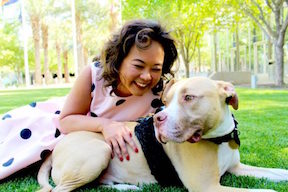 In order to change the laws or appeal to the breed, Fiona feels that people need to have a conversation. She says it was interesting when the Delta article went out, because quite a few people actually took the time to look her up on her website and send her messages about how they disliked Pit Bulls. She then thought, oh my goodness, here we go. Fiona thinks there's all this misconception of what Pit Bulls are and what they do. Someone even asked her why she was advocating for Pit Bulls other than the fact that she has Koda. She says she advocates for Pit Bulls because it's like racism for dogs. It's literally saying Koda can no longer go certain places because she's a small brown woman. It's saying you are small, brown and therefore you're not welcome here. That's essentially what you're saying to her. That's what we do to Pit Bulls. We demonize them for some reason that Fiona doesn't quite understand.
In order to change the laws or appeal to the breed, Fiona feels that people need to have a conversation. She says it was interesting when the Delta article went out, because quite a few people actually took the time to look her up on her website and send her messages about how they disliked Pit Bulls. She then thought, oh my goodness, here we go. Fiona thinks there's all this misconception of what Pit Bulls are and what they do. Someone even asked her why she was advocating for Pit Bulls other than the fact that she has Koda. She says she advocates for Pit Bulls because it's like racism for dogs. It's literally saying Koda can no longer go certain places because she's a small brown woman. It's saying you are small, brown and therefore you're not welcome here. That's essentially what you're saying to her. That's what we do to Pit Bulls. We demonize them for some reason that Fiona doesn't quite understand.
Part of this has to do with the media who has portrayed Pit Bulls as being a dangerous animal. Certainly, whenever there's some kind of attack or something like that, the media grabs it and they run with it. Of course the media never mentions anything about the Dachshund, which happens to inflict the most bites of any dog.
Fiona explains that Koda is so gentle. She has even had the same stuffed squeaky toy, an elephant named mouse, for many years. Fiona has had many dogs over the years and she has never seen a squeaky toy that gets used every single day for 18 months and the squeaker still works. If you ever had a dog with a squeaky toy, you know that most of them don't have a chance and are destroyed very quickly!
Visit Website
How To Achieve Litter Box Success - Dr. Debbie
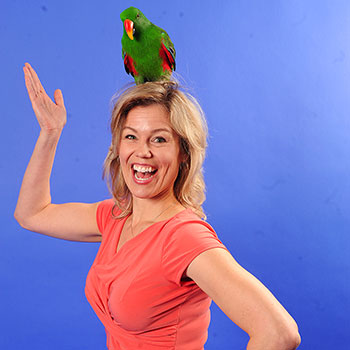 It's important to realize not all cases of inappropriate elimination are a "behavior" problem. In confirmed behavioral driven house soiling cases, 20-percent of the cats also had a contributing medical condition at the time. So even if it sounds like a behavioral problem, see your veterinarian to ensure your cat isn't the 1 in 5 that has discomfort, infection, or other health problems influencing her litter box use.
It's important to realize not all cases of inappropriate elimination are a "behavior" problem. In confirmed behavioral driven house soiling cases, 20-percent of the cats also had a contributing medical condition at the time. So even if it sounds like a behavioral problem, see your veterinarian to ensure your cat isn't the 1 in 5 that has discomfort, infection, or other health problems influencing her litter box use.
Drawing Kitty To The "Right" Spot
Check the condition of the box - is it urine stained on the bottom? Throw it out and get a new one. Keep the box clean by scooping twice daily and by performing a complete litter change out twice a week for non-clumping litter or every 2-3 weeks for clumping varieties.
To entice kitty back to the litter box try a litter box attractant like the herbal-based cat litter additive called "Cat Attract."
Multi-cat homes or those with outdoor cats nearby should use pheromone (scent hormone) products to ease social stress and facilitate litter box harmony.
Kitty Eliminates Near, But Not Quite In The Litter Box
Your kitty is telling you that she understands what you want her to do, but something isn't quite right in the litter box environment. First start with providing a larger box, even if this means buying a plastic under bed storage box for this purpose. Look for one sized 18 x 36 inches in size.
Remove any litter box covers. Revisit the traffic flow in the litter box area. Ensure the box is in a quiet, low traffic area. Keep the box unquestionably clean.
Is Your Cat Urinating In Tubs Or Sinks?
Chances are your cat has urinary tract inflammation or infection. The cool surfaces provide relief to the inflammation or discomfort of a medical condition. See your veterinarian for a urine evaluation and treatment since environmental changes alone will not stop the behavior.
To preventing further episodes, decrease access to tubs and sinks, close doors to bathrooms, or fill the bottom of sinks and tubs with a small amount of water.
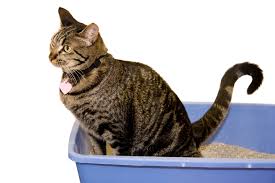 Kitty Eliminates On Throw Rugs And Won't Use Litter Box
Kitty Eliminates On Throw Rugs And Won't Use Litter Box
Your cat has already made a litter preference. Perhaps the texture of carpet is more appealing than the litter used. Provide a litter box smorgasbord. This is when you provide multiple litter pans at the same time, each with different litter varieties such as clay, clumping, and natural pine litter. Be sure to include one litter box with sections of throw rugs or carpet remnants lining the bottom. During this time, remove all throw rugs from the house or block kitty's access to those areas.
If kitty demonstrates a litter preference, switch her litter boxes to that style of litter.
If kitty chooses the rug-lined box, then continue providing carpet lined litter boxes to establish a good pattern of repeated box use. Gradually start sprinkling small amounts of cat litter in the box on top of carpet surface. With time, many cats can be retrained to accept the box as the carpet is phased out and just litter remains.
Prevent Returning To Scene Of Crime
Clean all house soiling accident sites with an enzyme based pet cleanser. The enzymes break down the chemical component of the odors, and do more than just cover up with scents. Do not use ammonia based cleansers on accident areas - doing so is counterproductive. (Remember that urine contains ammonia products.)
Cats dislike eating in areas that they eliminate, so place food and water bowls in the site of the accidents, or try placing pieces of aluminum foil in areas to deter kitty's use.
Citrus scents are offensive to cats and can be an effective cat deterrent. Use citrus or potpourri scented air fresheners in the area. If your cat is eliminating in house plants, place lemon or orange peels in the pot to make the area less attractive. And of course, make sure you aren't using citrus scented cleaners on the litter pan!
To keep your kitty away from areas she continues to eliminate on, use double sided sticky tape or turn plastic carpet runners upside down. Another option is to invest in motion-activated devices that spritz out citronella or puffs of air when the electronic eye picks up motion in the off-limits area.
The Tough Reality
For some cats, environmental changes aren't enough and drug therapy may be a necessary tool. But remember that behavioral medications aren't a shortcut - drug therapy must be used with veterinary monitoring and in conjunction with environmental changes.
Want to hear some bad news? In households struggling with many years of feline house soiling, it may be necessary to discard urine marked furniture, change out carpet, carpet pads, and treat sub-flooring to effectively remove scent triggers for future elimination issues. It may sound extreme, but it can be important step to achieve faithful feline litter box success.
Featured veterinarian known as "Dr. Debbie" on national pet radio program, Animal Radio. Ebook author of "Yorkshire Terriers: How to Be Your Dog's Best Friend"; "Pugs: How to Be Your Dog's Best Friend"; "Mini Schnauzers: How to Be Your Dog's Best Friend"; and "Shih Tzu: How to Be Your Dog's Best Friend." Dr. Debbie's books.
Visit Website
The Dogfather's Grooming Tip with Joey Villani
 Can Pet Shampoo Go Bad?
Can Pet Shampoo Go Bad?
Joey received a call from another groomer telling him about a rumor they heard, which Joey wasn't been able to confirm. The rumor was about a pet that died due to contaminated shampoo after being groomed.
You might have never thought about your pet's shampoo becoming contaminated. But think about, how long have you had your oldest bottle?
A lot of pet shampoos get diluted with water. Unless you're using distilled water, it's going to sour, it's going to spoil and it's going to do that rather quickly. This can happen within five to seven days. In Joey's grooming school, they would mix up 20 gallons a day of concentrated shampoo with water, and if they didn't use those 20 gallons in that day, they would throw the remainder out.
Joey tells us he has never heard of any cases of dogs actually dying from contaminated shampoo. However, contaminated shampoo can contain bacteria called furunculosis. As a result, your dog will get inflammation around the hair follicles. What happens next is that this area will get swollen, irritated and pus may even form. It is very discomforting for the pet.
If you have shampoo products that you've had for a long time, whether they are ones that should be diluted or the expiration date has gone bad, throw them out. If you're diluting them, you need to use the mixture within two to three days maximum, and then get rid of it. It's best to dilute only what you are going to use that day.
One way to tell if your pet's shampoo has gone bad is to smell it. If it doesn't smell like it smelled when you originally opened it up, it's probably bad and you should get rid of it.
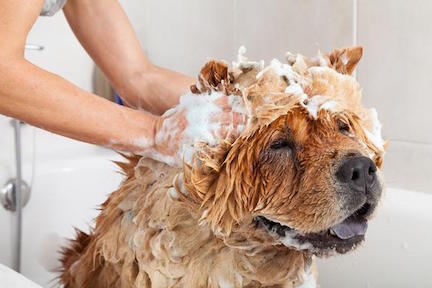 If you're having a problem with your pet coming home from the groomer and you're noticing that there is some skin irritation, you may want to bring your own shampoos to the groomer. Or, ask the groomer how often are they cycle through their shampoos.
If you're having a problem with your pet coming home from the groomer and you're noticing that there is some skin irritation, you may want to bring your own shampoos to the groomer. Or, ask the groomer how often are they cycle through their shampoos.
Humans use about a quarter size of shampoo when washing their hair, but how much shampoo should you use when bathing your dog? You might think you need to use a lot because it doesn't suds up like human shampoo does. Joey explains that you can use the same amount, just do multiple baths. So instead of trying to bathe your dog in one washing, wash and rinse them immediately two to three more times.
So how often should we be shampooing our dogs? If we do it too often, are we washing away the greases and oils that they need for their coat? Joey states that if you use the right product, you can bathe your pet every single day and you won't have a problem. If you use good product, you're not going to have irritation and you're not going to strip out the things that should be left behind. So use good product and wash everyday if that's what you want to do and you shouldn't have any problems.
Animal Radio News - Lori Brooks
 Animal Assisted Cancer Therapy
Animal Assisted Cancer Therapy
Not all so-called therapy dogs are for the benefit of the human they live with. Many dogs are taken to hospitals, libraries, schools and such, which is called animal assisted therapy. Some of the most dedicated of these special animals are those who see patients on cancer wards. The benefits of these animals has been documented with one study looking at the link between therapy dogs and children with cancer to see how animal assisted therapy would affect young cancer patients as well as their parents and even the dogs themselves. Seventy children and families were matched with at least 30 therapy dog-handler teams in 5 hospitals across the country. The findings, published in the Journal of Pediatric Oncology Nursing, showed regular visits from a designated therapy dog lowered stress and anxiety for the children and their families.
Used Grease From Restaurants in Pet Foods
The FDA alerted pet owners to the possible presence of pentobarbital in certain canned dog foods. The problem apparently arose from a company supplying tallow, or fat. To make tallow, the rendering company used cow, pig and poultry trimmings that included bone, hides and parts not fit for humans. Used cooking oil, or grease from restaurants, was also used to make the tallow.
 Parrots Slow Down Traffic by Moving Traffic Cones
Parrots Slow Down Traffic by Moving Traffic Cones
Kea parrots are big and about 18 inches long. They're native to New Zealand where they can be a pest, but they do attract the tourists. These big parrots have been caught on camera shifting traffic cones into active traffic lanes. Why? Because they're very smart. It's likely some cars slow down or pull over to avoid the moved cones, at which point the driver notices the keas and gives them food. The New Zealand Transportation Agency said it planned to test heavier traffic cones and warned motorists not to feed the parrots.
Pentobarbital Horse Meat Used In Pet Food
Through the freedom of information act, information came to light of pet food companies having pentobarbital tainted horse meat in some of its canned food. It is not illegal to use horse meat as pet food in the United States, as long as it's is shown on the label and the company has a specific license to use the meat. Records show an inspector found it on the premises of a pet food processing plant during an inspection that was made as a result of complaints over health concerns and unsanitary conditions at the facility.
 Listen to the entire Podcast of this show (#1242)
Listen to the entire Podcast of this show (#1242)





